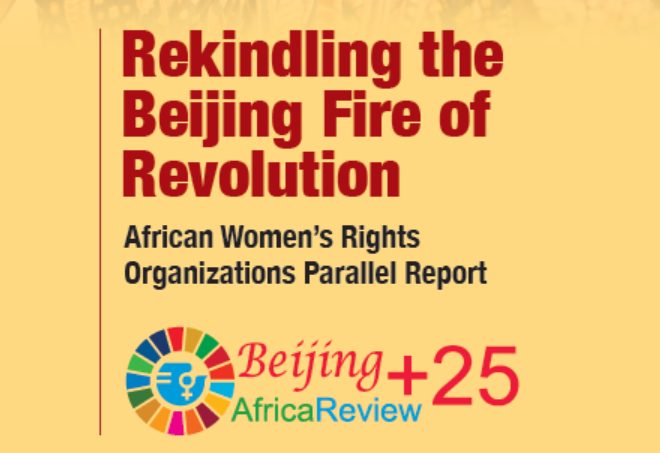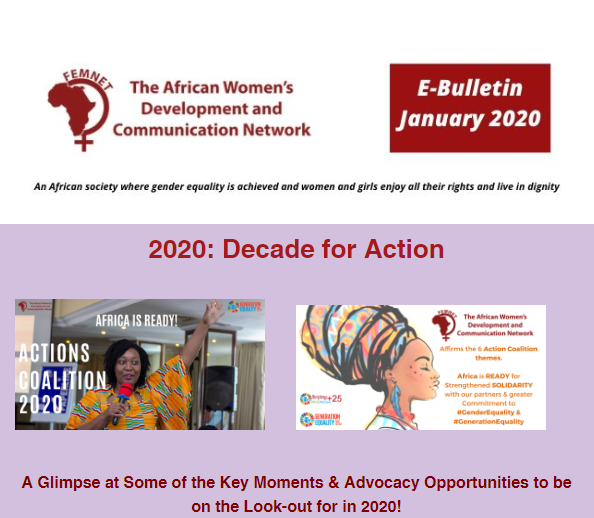FEMNET host Debriefing Meeting Post the 53rd Session of the 2009 CSW For Immediate Release
FEMNET host Debriefing Meeting Post the 53rd Session of the 2009 CSW For Immediate Release
30th April, 2009
For Immediate Release
Women in Africa have for a long time shouldered the responsibilities of providing care and support to their families and communities, in order to build strong families, communities and nations. African women have become unduly burdened by responsibilities of care giving, due to several factors including limited development of rural infrastructure, and unequal sharing of responsibilities between women and men. The HIV/AIDS pandemic has further compounded the burden of care giving on women and girls, by increasing the need for and scope of care provided. The impact is decreased household and economic productivity, limited access to education particularly for girls to participate in care giving, increased stress, violence in the public and private spheres, economic insecurity and decreased development in many communities.
Recently, representatives of United Nations Member States, UN entities and non-governmental organizations (NGOs) from all over the world met in New York at the 53rd Commission on the Status of Women, from 2 to 13 March 2009. The theme for the session was “The equal sharing of responsibilities between women and men, including care giving in the context of HIV/AIDS” which is critically relevant in the context of Africa.
In the Agreed Conclusions of the session, which is the final outcome document submitted to the United Nations Economic and Social Council, the Commission noted that the unequal sharing of responsibilities between women and men is very costly to the progress of development in society. The representatives also acknowledged that this imbalance weakens women’s labour market attachments in the form of women foregoing jobs, opting for shorter working hours, and being confined to mostly informal work, which results in lower wages and increased levels of poverty.
Women’s access to social security benefits is also weakened, and women are left with less time and resources for training, skill building and education, as well as for leisure and self-care.
The heavy demands on women’s time also makes it extremely difficult for women to engage in political activities, which would increase their self-awareness, self-development and opportunities to make their voices heard on various issues impacting their lives.
The African Women’s Development and Communication Network (FEMNET) in collaboration with its members in Uganda that is Uganda Women’s Network (UWONET), the National Association of Women Organizations in Uganda (NAWOU) and ICON (Women and Young People Leadership Academy) organized the first Post – 2009 Commission on the Status of Women debriefing meeting for Eastern and Southern Africa, to strategize on actions that NGOs, faith-based organizations, community groups and donors can take to support African leaders and governments to address the crisis of unequal sharing of responsibilities in care giving at all levels.
As Africa celebrates International Labour Day on May 1, 2009 FEMNET and all the participants at the Meeting urge:
African governments to ensure that unpaid labour, especially women’s labour expended in care giving is acknowledged as an economic resource and is taken into account in the national and regional economic figures. The first step in this process is for the African leaders and governments to ensure the collection of gender disaggregated data on labour including in the informal sector which would be critical in identifying and incorporating the value and cost of unpaid labour in society.
- African leaders and governments to commit resources for care giving including provision of equipment, human resource, drugs, nutrition, information dissemination and ensuring that programs are in place to support the retention of skilled labour in our countries
- African governments to mainstream gender perspectives in the development of legislation, policies and programmes addressing unpaid labour, social protection, work conditions, health care services and development of public infrastructure.
- Governments to take their primary responsibility of promoting awareness of the value of care giving as an essential element and the need for involving men and boys in sharing care giving responsibilities in order to reduce the disproportionate and costly burden on women and girls, and society in general.
- African governments that have not ratified the Protocol on the Rights of Women in Africa to do so before the next African Union (AU) Summit in July 2009 as a sign of clear commitment to implement one of the principles of the Constitutive Act of the AU, the promotion of gender equality which would go a long way in reducing the imbalances that result in the disproportionate burden of care giving on women and girls.
- The government of Uganda to ensure that in the 2009/ 2010 budget they cater for the establishment of the Equal Opportunities Commission as one of the key organs that can monitor progress made to reduce gender inequalities and imbalances that impact on the capacity of women and the girls to enjoy and realize their full rights and potential.
For Further Information Contact:
Carlyn Hambuba, Communication Officer, FEMNET: communication@femnet.or.ke
FEMNET Secretariat: admin@femnet.or.ke or TEL: +254 202712971/2
Ms. Norah Matovu Winyi, FEMNET Executive Director, TEL: +256 772 825 829
Related Tags
Related Posts
Rekindling the Beijing Fire of Revolution: Africa Beijing+25 Parallel Report
The Beijing+25 Africa Regional Civil Society Organisations (CSOs) parallel report provides an independent analysis of the last five years review and appraisal
Learn More2020: Decade for Action – FEMNET January 2020 E-Bulletin
A Glimpse at Some of the Key Moments & Advocacy Opportunities to be on the Look-out for in
Learn More







